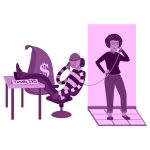 Don’t get scammed by phone calls, emails, or people claiming to be from the Internal Revenue Service.
Don’t get scammed by phone calls, emails, or people claiming to be from the Internal Revenue Service.
Have you ever gotten a phone call threatening that the “IRS” is filing charges against you, or confiscating your property tomorrow? Well, guess what?
The real IRS would never call or email you with such claims. The IRS sends those kinds of messages by US Mail or actual IRS agents.
Scammers often use threats and ultimatums demanding money over the phone or by email, and that should be your first hint that it’s not legit.
Oh, and about those gift cards they request payment on… DON’T DO IT!
Here’s what you need to know.
The IRS will NOT…
- Call to demand immediate payment using a specific payment method such as a prepaid debit card, gift card, or wire transfer. Generally, the IRS will first mail a bill to a taxpayer who owes taxes.
- Demand that you pay taxes without the opportunity to question or appeal the amount they say you owe. You can view your rights as a taxpayer on the IRS website.
- Threaten imminent legal action, such as incarceration, deportation, or suspension of drivers, business, or other licenses. Threats like these are common tactics scam artists use to trick victims into buying into their schemes.
- Send emails without your express and prior consent. Furthermore, the IRS will NEVER ask you to email sensitive information, such as your social security or bank account numbers, which you should NEVER send to anyone in email—EVER.
Learn more about reporting phishing and online scams on the IRS website.
The IRS will…
- Initiate most contacts via the United States Postal Service. There are special circumstances in which the IRS will call or come to a home or business, such as for overdue tax bills, but not before a notice is sent by mail.
- Present two forms of official credentials called a pocket commission and a HSPD-12 card if they show up in person. HSPD-12 is a government-wide standard for secure and reliable forms of identification for federal employees and contractors. The representative will provide you with a dedicated IRS telephone number to verify the information and confirm their identity.
- Instruct taxpayers to make payments to the “United States Treasury” if taxes are owed. Specific guidelines on how to make a tax payment are available at irs.gov/payments.
Learn more about how to know if it’s really the IRS calling or knocking on your door.